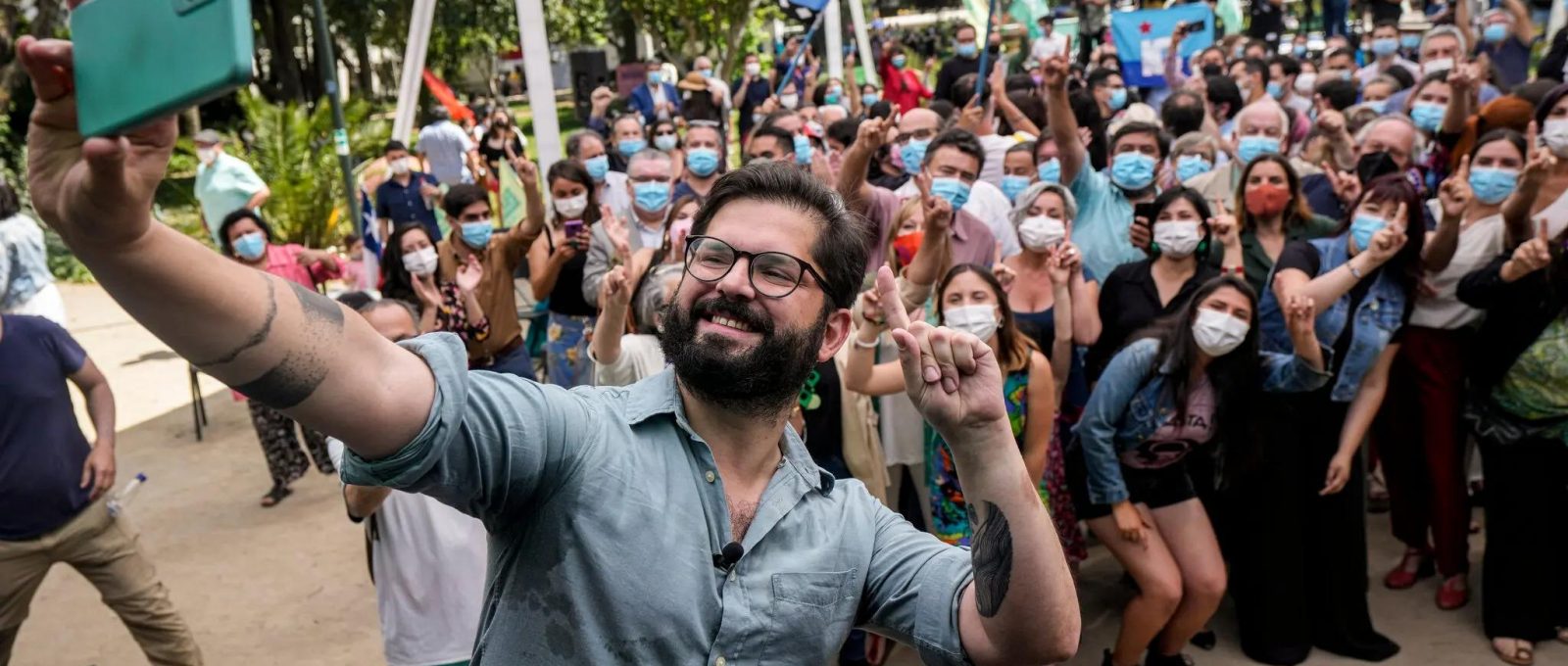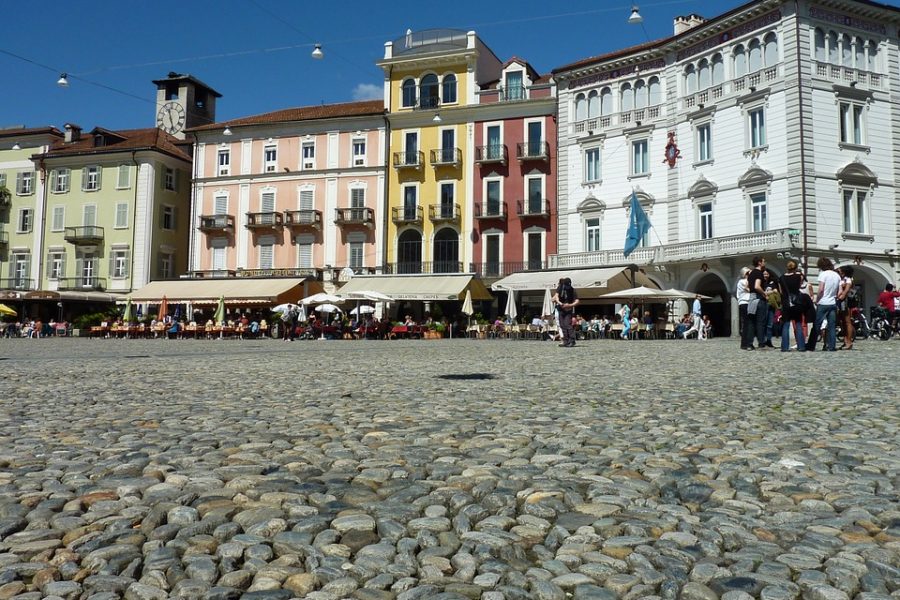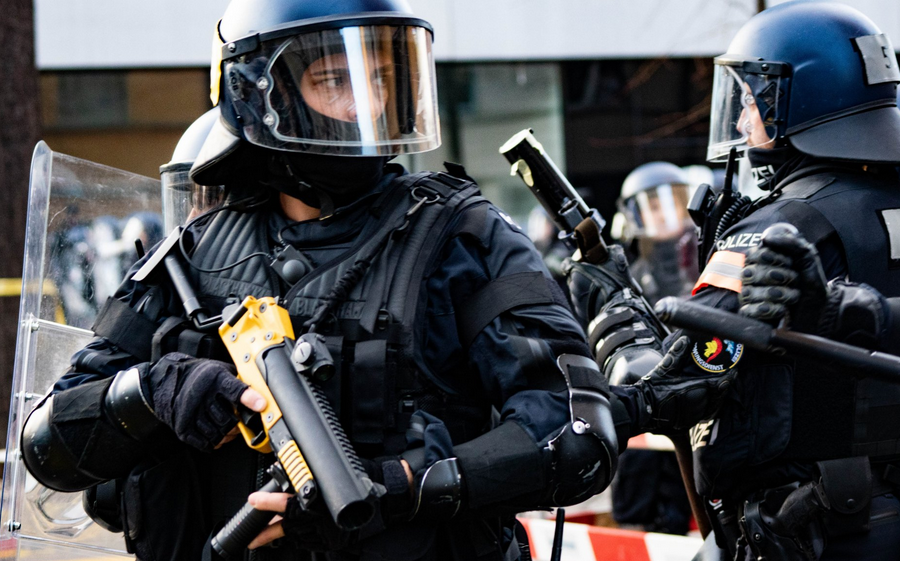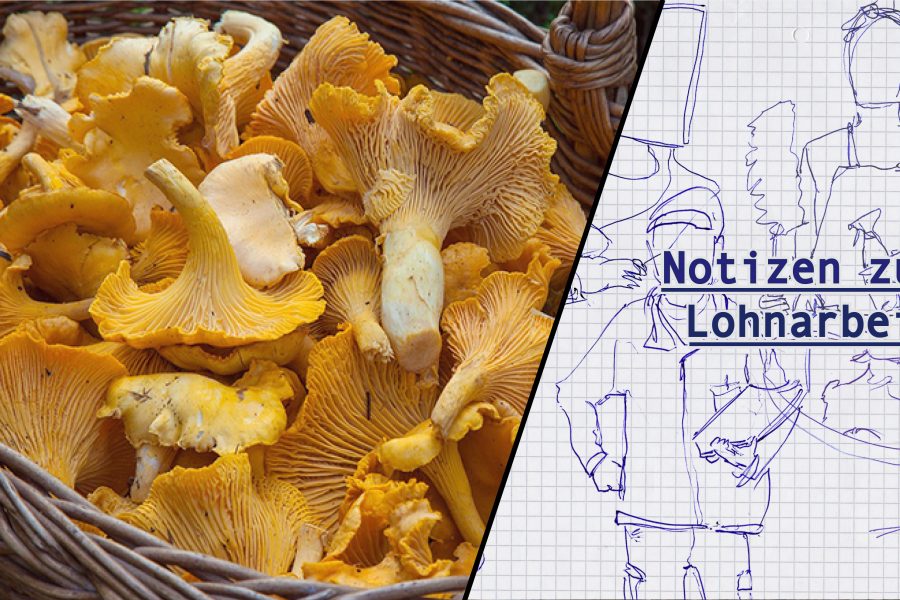Article by M. Lautréamont and Vamos Hacia la Vida: Das Scheitern der staatsafinen Linken in Chile.
Translated from german by Angry Workers: Original article.
Intro by M. Lautréamont, Ajour
There was great euphoria on the political left when Gabriel Boric won the presidential election in December 2021. The “Marxist” and former student spokesperson, who was labelled a “radical opponent of the system” by the media in 2011, was seen by many as a beacon of hope in the fight against neoliberal capitalism. In the frenzy of joy people forgot about the fact that Boric and the left-wing party alliance “Frente Amplio” had supported the repressive tightening of laws in 2019, which was aimed at criminalising social protests. Left-wing reformists of all stripes sensed a new left-wing era and were keen to see a continuity between the 2019 revolt, the election of Boric and the – now failed – new constitution. Anyone who used the word counter-revolution and pointed out that the social anger and council-like structures that had emerged throughout the country in the course of the revolt were channelled into institutional dead-ends by the left itself, and thus dissolved, was considered an unworldly maximalist. The political pragmatism that tends to stabilise the current power structures even advanced far into radical left and anarchist circles. Political pragmatism became the ideological maxim of a left that declared defeat to be a new hope and made forgetting history a virtue. Class struggle, autonomy and the self-organisation of the proletariat were not pushed back for the first time in the name of the “lesser evil”. It wasn’t a novelty that the left refused to denounce democracy as the tyranny of the world of commodities, but promoted it as a vehicle of social change. Little impressed by the impossibility of achieving far-reaching structural changes on the political terrain of bourgeois democracy, the left focused on stylising the ballot as an anti-fascist act. Whereas just two years ago a large part of the population had taken to the streets en masse and set in motion an unexpected social explosion that had caused the Piñeras government to totter, the democratic popular front against the far-right presidential candidate Kast was now seen as a militant act.
It is beyond the scope of this brief introduction to speculate on the real impact Kast’s election would have had on society. The fact is that not only have there been no significant social changes under the left-wing government to date, but that repression has even intensified in some cases. The recent and exorbitant prison sentences imposed on Francisco Solar and Héctor Llaitul are just the tip of the iceberg.
The anarchist Francisco Solar was sentenced to 86 years in prison last year – currently one of the highest prison sentences against political prisoners in the world. Solar is accused of carrying out three bomb attacks between 2019 and 2020 together with his ex-partner Mónica Caballero, who is serving a 12-year sentence. Although several police officers were slightly injured in the attacks, no one was killed. Nevertheless, he received an exceptionally high sentence.
Héctor Llaitul, on the other hand, is one of the best-known representatives of the Mapuche movement and spokesperson for the Coordinadora Arauco-Malleco (CAM). The CAM is a Mapuche group that uses militant means to fight against forestry companies and the state in the southern Chilean regions of Biobío and Araucanía. It sees its resistance as a continuation of the Mapuche’s centuries-long anti-colonial struggle and demands the return of their lands and independence from the Chilean state and its institutions. Llaitul was sentenced to 23 years in prison on the 7th of May this year: Five years for theft, two for assaulting authorities and for the remaining 15 years the public prosecutor’s office invoked the so-called State Security Law and accused Llaitul of “incitement to violence”. De facto, this means that the majority of the prison sentence was handed down due to Llaitul’s political views and statements.
The State Security Act was introduced at the end of the 1950s and served to criminalise social movements. From the outset, it was considered an “anti-communist” and “anti-subversive” law and was expanded and used in a targeted manner, particularly during the Pinochet dictatorship, to crack down on political opponents. The fact that the government is taking such vehement action against Llaitul is probably due to the fact that the state has an interest in protecting the interests of the forestry industry. According to a study published in 2021 by the Library of the National Congress of Chile, around 70% of forest plantations are located between the Bio Bio and Los Ríos regions and the forestry industry is the country’s second largest export sector after mining.1
Although the cases of Solar and Llaitul are not the only ones, they are currently the most conspicuous examples of the government’s repressive activities. In addition, there are other social problems that the government is facing and a whole host of promises that – as was to be expected – have not been kept. The anti-authoritarian communist group “Vamos Hacia la Vida” (VHV) from Santiago addresses all of these issues in the following text. It criticises the government’s current course and presents a summary of the failure of the pro-government left. These assessments by VHV’s comrades were written in May 2024 and are an update of past interviews conducted by German-speaking comrades. The comrades have already presented their analyses and positions on the revolt, the left-wing government and the efforts for a new constitution in detail on two previous occasions. The first interview with them was conducted in 2021 and the second in 2023. Anyone looking for a more detailed account of their assessments will find further information in these interviews. This text, on the other hand, is more compact and summarises the most important points of their assessments and criticism.
Chile: Ongoing Repression by the Left Wing of Capital
The government of Gabriel Boric
Gabriel Boric was already well known on the Chilean left before his presidency. He was politicised by the student movement of 20112, became a student spokesperson and was one of the people who contributed to the demobilisation of the movement. 10 years later, on the 19th of December 2021, he won the presidential election in the second round by a large margin over his opponent José Antonio Kast – a far-right, anti-communist Pinochetist. This success was celebrated by democrats and left-wingers alike as a “triumph over fascism at the ballot box”. They saw Boric’s election victory as a continuation of the uprising of the 8th of October 2019 and as a guarantee for the establishment of a new constitution. After the election victory, the mood was completely different to the situation after the first round of voting, when the same protagonists complained loudly about non-voters: phrases such as “if you don’t vote, you are playing into the hands of the right” and “Chile hasn’t woken up” were omnipresent, especially as the fear of Kast winning the election was widespread. In the end, it was precisely this fear that led to Boric’s election victory.
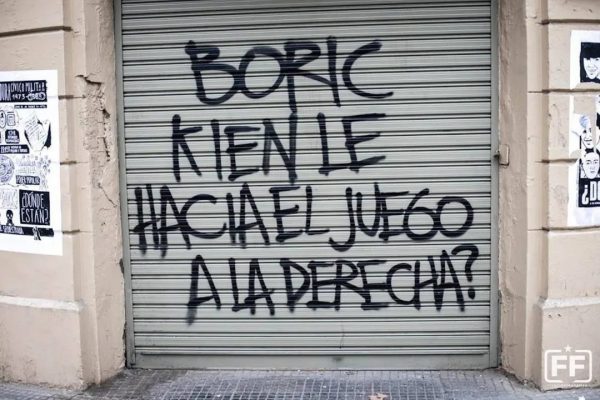
During the election campaign, both candidates focused their discourse on the political centre. Boric sought the backing of the old Concertación government3 (Christian Democrats, Socialist Party, etc.). Kast, on the other hand, endeavoured to appeal to women’s rights in order to distance himself from some of his supporters who had stood out for their misogynistic and reactionary positions and had supported his campaign. This “pseudo-battle” between the left and the right of capital resulted in Boric’s campaign being “critically supported” by LGTBIQ+ communities, institutional feminists, anti-fascist leftists and anti-Kast voters. In other words, the threat of a caricature of fascism meant that Boric was able to mobilise his opponents in his favour. He must have been aware that his election would close down the revolutionary cycle and the revolutionary perspective of the October experience or postpone it for a considerable time.
It should be noted that left-wing groups were responsible for the massive decline in street protests. The excuse for this was always the same: Boric’s government and the constitutional process must not be “portrayed in a bad light” so as not to “play into the hands of the right”. At the same time, left-wing groups were also responsible for the disappearance of the autonomous structures of the class (the so-called territorial assemblies4), which resulted in the isolation and repression of any discussion that eluded the electoral agenda or the constitutional debate. In general, the left groups, even those which define themselves as revolutionary, as well as broad sections of the anarchist movement, were led into a democratic dead-end willingly and without resistance. The noose of democracy needed no masquerades and was transparent from the outset. By taking sides to maintain capitalist conditions, the left of capital has once again made its historical role clear. The theoretical limitations of many comrades emerged in all clarity, as did their inability to learn the lessons of history.
The revolt opened a cycle of struggle that today faces a counter-revolutionary wave. Nevertheless, the cycle is not yet complete, especially considering that the impressive Chilean revolt was the expression of a generalised and global crisis.
Continuation and intensification of repression
It did not take long for it to become clear that Boric’s government is characterised by a brutal continuation of the previous government’s course. On the one hand, there is strong repression, and on the other, the government has implemented a policy that promotes capitalist restructuring to the detriment of our already precarious living conditions. This does not surprise us, because we have not forgotten that Boric was a key figure in the implementation of the counter-revolutionary “Agreement for Social Peace and the New Constitution”5 . The agreement was signed on the 15th of November 2019 to tame the power of the revolt, channel it into institutional channels and initiate a process of capitalist restoration, the central axis of which was the drafting of a new constitution. In addition, the so-called Nain-Retamal law6 was introduced in April 2023, which protects and further strengthens the police (carabineros, criminal police and gendarmerie7). In practice, the law means that the rash use of firearms (known as “gatillo fácil” in Spanish) has been legalised, which has already claimed several lives. In addition, the “Ley Antitomas” was introduced at the end of November 2023, a law against squatting that penalises the “appropriation and illegal occupation of real estate” with prison sentences. This criminalises poverty and the associated lack of access to housing. The Boric government is taking the side of property speculation, gentrification and the sacrosanct right to private property: squats, social centres, squats by residents from poor neighbourhoods and land reclaimed from the Mapuche people have already been evicted. As if this were not enough, there is also the government’s unconditional defence of the chief director general of the police, Ricardo Yáñez. The trial against Yáñez has already been postponed several times. The Chilean public prosecutor’s office wants to hold him accountable for his involvement in human rights violations during the uprising.
In addition, repressive measures such as the “Anti-Sabotage and Anti-Barricade Law” (Law 21. 208) and the State Security Law continue to be applied in a targeted manner. For example, against the spokesperson of the Mapuche association “Coordinadora de Comunidades en Conflicto Arauco Malleco-CAM”, Héctor Llaitul, who has already been found guilty in a political trial and whose sentence will be announced on the 7th of May. He faces up to 25 years in prison. The law is also to be applied against many other Weichafes8 from the CAM and other organisations who were imprisoned between 2022 to 2024. Comrades from the anarchist milieu are also facing this selective repression, for example in the case of the bomb attack on the General Directorate of the Gendarmerie9 and the arson attack on the Carnes Susaron meatpacking factory10. But the State Security Act is also used against demonstrators arrested during street clashes. The long and exemplary prison sentences given to the anarchists Francisco Solar (86 years in prison) and Mónica Caballero (12 years in prison) for explosive attacks in which no one was killed are a paradigmatic case that expresses the repressive climate in which we live.
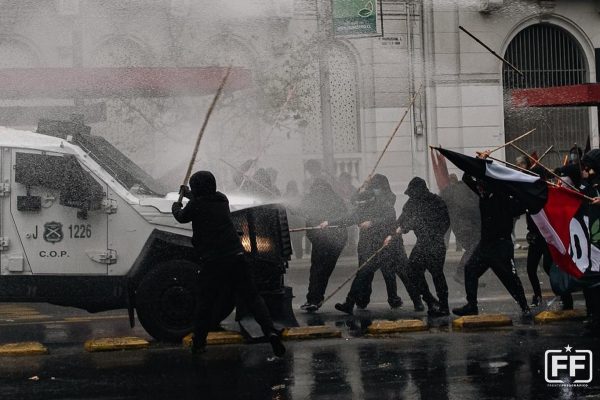
The autonomous Mapuche movement (Coordinadora Arauco Malleco-CAM, Resistencia Mapuche Lafkenche-RML, Weichan Auka Mapu-WAM, Liberación Nacional Mapuche, etc.), for its part, continues to expropriate land and sabotage the capitalist machinery and infrastructure on an almost daily basis, despite the state of emergency that is permanently in force in the so-called “southern macrozone”: the military patrols the area and carries out checks on motorways and roads to protect the “strategic infrastructure”. The repression keeps more than fifty Mapuche political prisoners behind bars.
At the same time, the prevailing discourse of the “iron fist” against crime and “illegal” migration is almost indistinguishable from the most reactionary ultra-right. “Either they legalise their status or they leave” was Boric’s ultimatum to migrants residing in the Chilean region without valid residence papers. This threat was complemented by the construction of trenches on the border with Bolivia in order to “contain the migration crisis”. “We will hunt down crime like dogs,” Boric declared, while the government is already looking into implementing “Mexican strategies” – with everything that entails – to combat the growing crime rate. Added to this is the ridiculous police reform, which is limited to a change in uniform and a reduction in recruitment requirements. People of smaller stature, with tattoos, flat feet or tooth decay can now become police officers. The government has fully supported the police in all respects, allowing hundreds of cases of police violence during the uprising, including torture, sexual assault and murder, to go completely unpunished. So far, 54 laws related to “public security issues” have been passed, far more than in any previous government. The laws increase the penalties for crimes and provide legal protection for the forces of repression so that they face virtually no consequences.
Boric’s election promises, including many structural reforms, have hardly been implemented and there are no signs that they will be realised in the near future. The ruling coalition pinned all its hopes on the elections on the 4th of September 2022 when a new constitution was put to the vote. They hoped that after winning the elections, they would be able to “implement the major changes that Chile needs”. But this never happened. As is already known, the constitutional reform suffered a clear defeat. The factors that led to this failure were numerous and too complex to summarise quickly, but the following aspects should be highlighted: the lack of clarity and the abstract wording of the draft, the high inflation at the time (12.8%), the introduction of compulsory voting with the threat of a very high fine (almost half a minimum wage), the implementation of austerity policies and the prevention of early payment of pension savings.11 In this respect, the rejection of the draft constitution was a punitive vote against the government. Perhaps the only positive thing the president did was to pardon in late 2022 12 prisoners of the insurgency and a former FPMR member12 accused without evidence of a bank robbery. But even these pardons are completely inadequate in view of all the other political measures taken by the government.
Consider, for example, the adoption of the Trans-Pacific Partnership Agreement (TPP11), which is opposed by various social organisations because this extractivist business model is destructive, privatises the use of seeds and undermines labour rights, among other things. Boric himself was an opponent of the agreement for several years. Another example that illustrates the course of the left-wing government is the “pension reform” project, which in no way calls into question the foundations of the broken and exhausted pension system called AFP [Administration de Fondos de Pensiones, private pension system]. The AFP pays starvation pensions and, in addition, workers finance large groups of companies through their contributions. The private pension system does not even remotely resemble a “social insurance system” as it exists in Western countries.
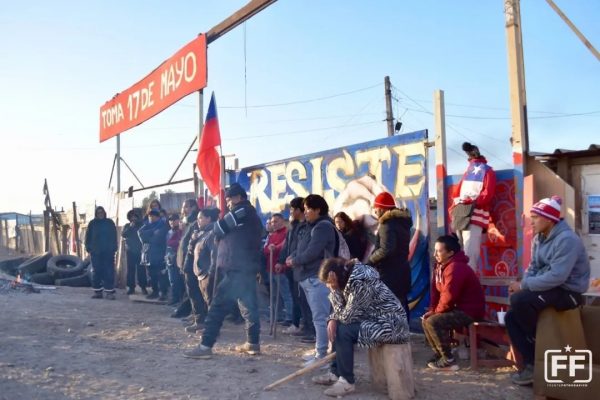
In March 2023, the Boric government presented its project to establish the National Lithium Company (“ENL”) to Congress, which was to “contribute to the production process of raw materials and develop more sustainable extraction methods”. However, the original project for state exploitation of the mineral resource and profit generation resulted in a covert privatisation through an agreement between the state copper mining group CODELCO (51%) and the private company SQM13. The involvement of private companies represents a silent privatisation of a resource that should be nationalised under the current constitution. The state-private partnership contradicts the election promise to establish a 100% state-owned company.
With the last plebiscite, the constitutional process completed its cycle; the Pinochet-Guzmán constitution remains in force. In the new vote on a constitutional amendment on the 17th of December 2023, the left called for the constitution to be retained because, unlike the draft presented in September 2022, the last proposal for constitutional reform was heavily influenced by the Republicans and the conservative right. All this points to a resounding failure of reformism, which has not yet been fully exploited by the right, as their proposal has also failed and they are internally divided. In short, today there is an even greater delegitimisation of politics, people are fed up with electoral events and compulsory voting.
Prospects for the future
We believe that in the midst of this mess, the revolutionary minorities have several urgent tasks to fulfil. The first and most obvious one is to deepen theoretical debates in order to better understand the times we live in and to promote discussions in a spirit of solidarity between different groups and organisations in the radical milieu. However, it is also important to externalise these debates. Secondly, and relatedly, it is essential to keep moving and to build proletarian associations and networks that are in continuous exchange and that gradually overcome the fragmentation and sectarianism that prevail today.
Furthermore, we believe that the active minorities can act as mediators between the different struggles, always taking antagonistic positions in them, through which capitalist relations and the divisions they entail can be overcome. It is important in these struggles to propagate the communist and anarchist horizon as the only realistic possibility for the future. We also believe that in the midst of a multidimensional crisis scenario, it is important to promote and support proletarian self-organisation aimed at subsistence and survival (solidarity kitchens, community gardens, collective health and care structures, etc.). The collective organisation of social reproduction can become the nucleus of communist potential.
Finally, we would also like to point out that we believe it is urgent to reopen the debate within our class on the “takeover of the means of production” and its communisation. Given that we live in a world with a complex division of labour, we believe that it is still crucial to communise strategic sectors that are essential for social reproduction (food, energy, telecommunications, health and housing). This collectivisation can develop at the local/regional level in a longer process of international struggle.
- See article here ↩︎
- The student movement was at that time the largest social movement since the return to democracy in 1990; it was directed against the high school and university fees and demanded free education for all and a comprehensive reform of the education system. Trade unions, environmental activists and large sections of society showed solidarity with the protests. (editor’s note) ↩︎
- The centre-left alliance formed the government between 1990 and 2010. ↩︎
- Hundreds of these council-like structures spread throughout the country in the course of the 2019 revolt. They should not be confused with the so-called “cabildos”. The latter were open assemblies that mainly mobilised for the new constitution. The Asambleas Territoriales, on the other hand, were autonomous structures of struggle, they were bodies of coordination and organisation that unfortunately did not spill over into production. See the translations of the Eiszeit group that were published during the revolt here. ↩︎
- In order to contain the revolt, new laws and penalties were created and the penalties for existing offences were increased. The repressive measures were supported by the left-wing alliance “Frente Amplio”. ↩︎
- The law was named after two police officers who were murdered between 2020 and 2022. ↩︎
- The gendarmerie is responsible for keeping order in prisons in Chile. ↩︎
- The Mapuche call their warriors “Weichafe” in their language Mapudungun. ↩︎
- The bomb exploded in Santiago on the 24th of December 2021, with the anarchist group “Black Revenge” claiming responsibility for the attack. ↩︎
- The arson attack took place in 2022. ↩︎
- In order to curb the precarisation caused by the pandemic, the previous government had approved multiple early payments of a certain amount of pension. ↩︎
- The Frente Patriótico Manuel Rodríguez (Manuel Rodríguez Patriotic Front) was a left-wing guerrilla organisation founded by the Chilean Communist Party in 1983 to overthrow Pinochet. ↩︎
- The owner of the chemical and mining company is Julio Ponce Lerou, Pinochet’s former son-in-law, who was involved in corruption cases, financial scandals and illegal political financing. ↩︎

